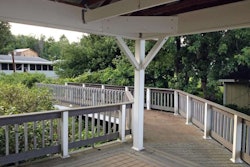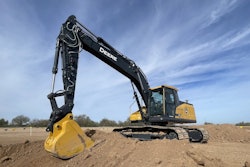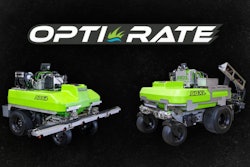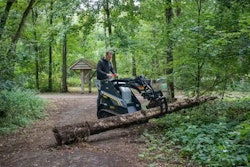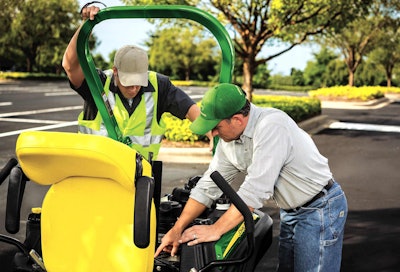 Photo: John Deere
Photo: John DeereAs lawn care season ramps up, equipment maintenance is a key component to making sure that your downtime stays at a minimum and your machines remain in tip top shape.
Equipment that is not cared for properly cannot be expected to perform at its best just as how an out of shape person is not going to be able to win a marathon. Also, preventative maintenance is much less expensive than having to repair or replace a zero-turn mower that has been neglected.
“Preventative maintenance is common sense,” says Lenny Mangnall, technical service manager with Exmark Manufacturing. “Not only will maintaining equipment throughout the busy mowing season provide high-quality results, but it will also add to the longevity of the machine’s engine and components and keep everyone safe.”
Each manufacturer has their own recommended service intervals, but it is advised to be proactive and make oil and filter changes before these checkpoints are reached.
The operator’s manual will contain a list of times to check and service so you can set up a reliable maintenance schedule from this. Even when in-season, these mowers have maintenance and safety checks that should be done on a daily, weekly and monthly basis, depending on the task.
“It’s easy to forget about or just ignore preventative maintenance during the peak mowing season, but in reality, that’s the most crucial time,” Mangnall says. “Not only will it extend the life of the machine, but it also encourages safety and reduces downtime. That means more time spent mowing and adding to the bottom line.”
Here are some of the basic components you should always inspect and maintain.
Blades
Frequently ensuring that mower blades are sharp and level can improve the quality of cut. Bent or altered blades will affect airflow and harm cut quality. When sharpening blades, make sure they are properly balanced afterwards to prevent vibration damage to the mower deck.
Fuel
Conventional fuel will deteriorate over time if stored for too long and can damage engine components if it is used. Propane users don’t have to worry about this aspect as the fuel has an indefinite shelf life. Most manufacturers have replacing the fuel filter scheduled at every 100 hours.
Gasoline with an ethanol content higher than 10 percent should not be used. Not only is it is harmful for your equipment, it is also illegal to use higher ethanol blends in outdoor power equipment.
Air and oil filters
Air filters should be checked each day before leaving the shop. If the outside of the filter is dirty but the inside of the filter is clean, the filter is still functioning properly. The filter can be cleaned by lightly tapping it to remove dirt and debris and the housing can be cleaned with a clean damp cloth. Most air filters should be replaced every 100 hours, but this might shorten in dustier conditions.
Checking the oil levels before leaving the shop is another good rule of thumb, as the last thing you want is to be out on a job and the mower stops. It is important to change engine oil and oil filters regularly as its lubricity and viscosity degrades with use.
Mower deck
All of the mower should be cleaned, but it is especially important for the mower deck as grass clippings and mulched leaves can build up and harden into a gunk that has to be scraped off at times. Regularly cleaning the top and bottom can prevent the deck from rusting and protect the unit’s belts.
Deck belt tension springs should be adjusted as needed and the height and angle on all sides should be examined on a level surface to ensure optimal mowing quality.
Lubrication
All grease fittings should be lubricated with the appropriate amount of grease specified in the owner’s manual as too much or too little can damage fittings and bearings. The front pivot axle and caster axles should be lubricated every 10 hours while the deck wheels should be lubricated every 50 hours on average.
Tires
Tire pressure is another factor that can affect the quality of cut as well as mower traction if the tires are over- or under-inflated. If your mower is cutting unevenly, tire pressure can often be the culprit for setting the deck off. It’s also important to check for worn tread just like you would with a car as this will indicate when it’s time to replace a tire.


